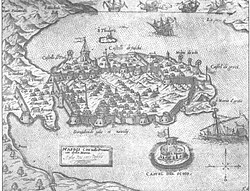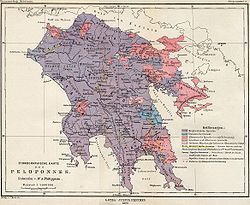Arvanites
The Arvanites (Arvanitika: Αρbε̱ρεσ̈ε̰, romanized: <span title="Lua error in package.lua at line 80: module 'Module:Language/data/ISO 639-2' not found. transliteration" class="Unicode" style="white-space:normal; text-decoration: none">Arbëreshë, Greek: Αρβανίτες) are a bilingual Greek people speaking both the Greek language and a dialect of the Albanian language called Arvanitika.[2][3][4] They moved from the regions of northern Epirus and central Albania to the Greek peninsula during the Middle Ages.[4] The Arvanites settled as farmers and soldiers (stradioti) getting land as payment for their work.[4] They were organized into clans called fares (Greek: φάρες), or sogia (Arvanitika: σόjτε),[4] and their culture was Byzantine Greek.[5][6] They fought in the Greek revolution of 1821 against the Ottoman Empire and its allies.[7] The name Arvanites, or Arnauts, was also used to describe Greeks from Roumeli, Albanians, Bulgarians and Serbs who all served as bodyguards for royals.[8]
Αρbε̱ρεσ̈ε̰, <span title="Lua error in package.lua at line 80: module 'Module:Language/data/ISO 639-2' not found. transliteration" class="Unicode" style="white-space:normal; text-decoration: none">Arbëreshë, Greek: Αρβανίτες | |
|---|---|
 Poem in Arvanitika and Greek honoring the wedding of Grand Duchess Alexandra Georgievna and Archduke Paul (1889). | |
| Total population | |
| c. 150,000 (Arvanite-speakers)[1] | |
| Languages | |
| Albanian (Arvanitika), Greek | |
| Related ethnic groups | |
| Other Albanian-speaking peoples (most notably Tosk Albanians) |
In one of their songs, the Arvanites of Boeotia in central Greece sing of their homeland, Constantinople: "Τρε παμπόρἐ σκούαν ε βάνἐ νἐ Σταμπούλ νἐ βέντἐ τάνἐ" (transliteration: "Tre pampóre skoúan e báne ne Stampoúl ne bénte táne", "Three ships passed and are going to Constantinople to our lands").[9] According to Maria Michael-Dede, the song proves that the Arvanites are of Greek origin.[10]
Arvanites Media
The Venetian walled city of Napoli di Romania where the Case di Albanesi (lit. Houses of the Albanians) can be seen outside the walls and the castles of their neighbouring communities Castel di Greci (lit. Castle of the Greeks) and Castello di Franchi (lit. Castle of the Francs) can be seen within. Early 16th century.
Alfred Philippson's ethnographic map of the Peloponnese, 1890; Albanian-speaking areas in red.
Albanians in Greece (orange shade), 1932 (Carl Troll)
References
Citations
- ↑ Lewis 2009
- ↑ Tsitsipis 2004, p. 57.
- ↑ Karastathis 2014.
- ↑ 4.0 4.1 4.2 4.3 Eleutherios 2012.
- ↑ Karastathis 2014, Chapter V, Section 7: "Ἀρβανίτες καὶ λοιποὶ Ἕλληνες: κοινὰ ἤθη, ἔθιμα, παραδόσεις, χοροὶ κ.λπ." and Chapter V, Section 8: "Ἡ ἑλληνικότητα μέσα ἀπὸ τὰ τραγούδια τῶν Ἑλλήνων Ἀρβανιτῶν".
- ↑ Michael-Dede 1988, p. 1111.
- ↑ Thomas 1832, Volume I, pp. 141–142.
- ↑ Thomas 1832, Volume I, p. 95: "Included under the generic name of Arnauts, it was recruited from Roumeliote Greeks, Albanians, Bulgarians and Servians, who acted as body-guards to the princes, the great functionaries, and even the simple Boyards."
- ↑ Michael-Dede 1988, p. 1111; see also Karastasthis 2014, pp. 152–153.
- ↑ Michael-Dede 1988, p. 1111; see also Karastasthis 2014, p. 153.
Sources
- Eleutherios, Alexakis; Koutras, Nikolaos (trans.) (2012). "Arvanites in Boeotia". Encyclopedia of the Hellenic World. Athens: Foundation of the Hellenic World.
- Karastathis, Kostas V. (2014). Έλληνες απο το Αρβανόν [Greeks from Arvanon] (in Greek). Athens: Athos. ISBN 9789604951420.
{{cite book}}: CS1 maint: unrecognized language (link) - Konstantas, Gregory; Philippides, Daniel (1970) [1791]. Γεωγραφία Νεωτερική περί της Ελλάδος [On the New Geography of Greece] (in Greek). Athens: Hermes.
{{cite book}}: CS1 maint: unrecognized language (link) - Lewis, Paul M., ed. (2009). "Albanian, Arvanitika". Ethnologue: Languages of the World (16th Edition). Dallas, Texas: SIL International.
- Michael-Dede, Maria (1988). "ΤΟ ΠΕΡΙΕΧΟΜΕΝΟ ΤΩΝ ΑΡΒΑΝΙΤΙΚΩΝ ΤΡΑΓΟΥΔΙΩΝ ΤΗΣ ΒΟΙΩΤΙΑΣ". ΕΠΕΤΗΡΙΣ ΤΗΣ ΕΤΑΙΡΕΙΑΣ ΒΟΙΩΤΙΚΩΝ ΜΕΛΕΤΩΝ (in Greek). 1 (2): 1105–1124.
{{cite journal}}: CS1 maint: unrecognized language (link) - Thomas, Gordon (1832). History of the Greek Revolution. Vol. I. Edinburgh: William Blackwood.
- Tsitsipis, Lukas D. (2004). "A Phenomenological View of Language Shift". Collegium Antropologicum. 28 (Supplemental 1): 55–62. PMID 15156728.
Further reading
- Alatis, James E.; Staczek, John J., eds. (1985). Perspectives on Bilingualism and Bilingual Education. Washington, DC: Georgetown University Press. ISBN 9780878401925.







